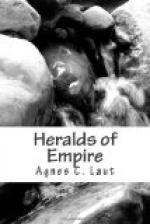The Indians led us to the lodges of the hostiles safely enough; and their return gave us entrance if not welcome to the tepee village. We had entered a ravine and came on a cluster of wigwams to the lee side of a bluff. Dusk hid our approach; and the absence of the dogs that usually infest Indian camps told us that these fellows were marauders. Smoke curled up from the poles crisscrossed at the tepee forks, but we could descry no figures against the tent-walls as in summer, for heavy skins of the chase overlaid the parchment. All was silence but in one wigwam. This was an enormous structure, built on poles long as a mast, with moose-hides scattered so thickly upon it that not a glint of firelight came through except the red glow of smoke at the peak. There was a low hum of suppressed voices, then one voice alone in solemn tones, then guttural grunts of applause.
“In council,” whispered Godefroy, steering straight for the bearskin that hung flapping across the entrance.
Bidding Jack Battle stand guard outside, we followed the Indians who had led us from the fort. Lifting the tent-flap, we found ourselves inside. A withered creature with snaky, tangled hair, toothless gums, eyes that burned like embers, and a haunched, shrivelled figure, stood gesticulating and crooning over a low monotone in the centre of the lodge.
As we entered, the draught from the door sent a tongue of flame darting to mid-air from the central fire, and scores of tawny faces with glance intent on the speaker were etched against the dark. These were no camp families, but braves, deep in war council. The elder men sat with crossed feet to the fore of the circle. The young braves were behind, kneeling, standing, and stretched full length. All were smoking their long-stemmed pipes and listening to the medicine-man, or seer, who was crooning his low-toned chant. The air was black with smoke.
Always audacious, Godefroy, the trader, advanced boldly and sat down in the circle. I kept back in shadow, for directly behind the Indian wizard was a figure lying face downward, chin resting in hand, which somehow reminded me of Le Borgne. The fellow rolled lazily over, got to his knees, and stood up. Pushing the wizard aside, this Indian faced the audience. It was Le Borgne, his foxy eye yellow as flame, teeth snapping, and a tongue running at such a pace that we could scarce make out a word of his jargon.
“What does he say, Godefroy?”
“Sit down,” whispered the trader, “you are safe.”
This was what the Indian was saying as Godefroy muttered it over to me:
“Were the Indians fools and dogs to throw away two fish for the sake of one? The French were friends of the Indians. Let the Indians find out what the French would give them for killing the English. He, Le Borgne, the one-eyed, was brave. He would go to the Frenchman’s fort and spy out how strong they were. If the French gave them muskets for killing the English, after the ships left in the spring the Indians could attack the fort and kill the French. The great medicine-man, the white hunter, who lived under the earth, would supply them with muskets——”




